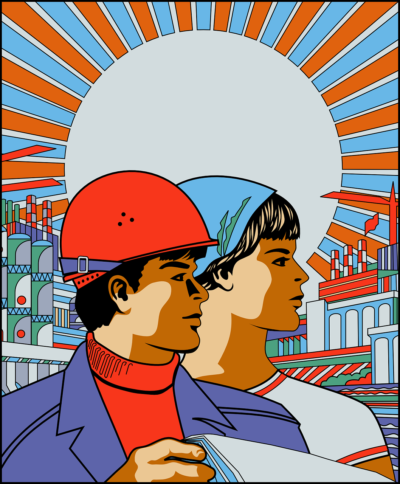Growing up was weird.
I always had fish salad for lunch. My parents were overly concerned with my math grades. My grandparents had funny accents. We didn’t speak English at home. I grew up believing that, for all intents and purposes, I was Russian, despite the fact that I was born and had grown up in the United States. My parents were involved in the local “Russian scene.” I went to Russian school on the weekends.
This dichotomy makes the Russian Jewish experience unique, and as a result, Russian-speaking Jews (hereafter RSJs) don’t always feel at home within traditional American Jewish programming. This can be equally true for Russian-speaking Jewish students who want to get involved with Jewish life on campus.
Our parents’ and grandparents’ experiences of anti-Semitism sometimes make them reluctant to send their children to Jewish schools or to encourage them to participate actively in Jewish life.
“I believe that my family was deeply affected by the prejudice against Judaism in the FSU,” Anton Relin, a student at University of Pennsylvania, said. “My grandparents and my father always hesitated to put it on documents (even if it was what got us into the United States). I remember my grandmother crying when I told her I marked myself as Jewish on my application to university. She thought I had lost all of my chances of being accepted there.”
Tatiana Uklist, a recent graduate of University of Houston, shared a similar experience. “My mom faced a lot of anti-Semitism growing up, and her mom was orphaned during the Holocaust, so Judaism wasn’t really pushed on me,” she said.
Out of the four Russian-speaking Jewish students interviewed, three did not go to Jewish day school.
That said, not all RSJ families are like this. Hanna Briskin, a student at University of Maryland, came from a kosher and Shabbat observant home. “My parents were very devout. And honestly, there are some traditions and mindsets in my home whose history I don’t know — whether they are Jewish or Russian. It didn’t really matter,” she said. Briskin went to a Modern Orthodox Jewish day school.
Many RSJ students – myself included – find it difficult to integrate into their college Jewish communities. Relin told me that he participated in Hillel events but felt a disconnect because of his lack of Jewish education. “Having not been raised going to Jewish day schools, I find many of the events at Hillel have a high bar of entry,” he said. “I often feel not Jewish enough to continue participating in many of those events.”
But that experience doesn’t speak for everyone. David Lysenko, a student at Georgetown University, attended Hebrew school until he was 13 and had a bar mitzvah. He still attends High Holy Day services and now identifies as a Conservative Jew.
I ultimately asked each student which two adjectives (out of three) they would choose to describe themselves – Russian, Jewish, or American. They all had to think deeply about their answers.
“Jewish first and Russian/FSU second,” Uklist said, “This was hard to narrow down because being both Russian/FSU and American are a huge part of my identity.”
“This is definitely a tough question,” Lysenko said, “Given the options, I would have to say American and Jewish.”
Relin pondered. “I would choose American and Russian,” he decided. “For me, identity in this aspect is very closely tied to language. Since I don’t speak Hebrew, I feel that I cannot call myself Jewish before I can call myself Russian.”
Briksin alone didn’t hesitate. “This is something my parents and I have discussed at length since I was a little kid,” she said. “I’m a Jewish American. The USSR is where my parents are from. I have respect for their traditions and history and intend to keep these things going in my family. But they also consider themselves Jewish Americans. If people ask where they’re from, they know to say Russia – but they and I are citizens of the US and our allegiances are with this country. Among my Jewish American friends, I have a very large Russian Jewish network. And we call ourselves Russian Jews, but only because we have an understanding that we are American before we are Russian.”
This balancing act – in effect, feeling both strongly Russian and strongly Jewish – makes traditional campus programming less appealing perhaps to some FSU campus Jews. Our families’ experiences with anti-Semitism have often carried over into our Jewish education and self-perception. Campus organizations need to be sensitive to that and give FSU Jews the opportunity to perhaps create their own programming or at least create spaces where they specifically can explore their Jewish identities.
Hillel is just beginning to create an FSU internship (called the Russian-speaking Jewish Engagement Internship Cohort or RSJ), and there are various Russian-Jewish clubs at universities like Cornell, University of Massachusetts, and Rutgers. Still, FSU Jews are numerous and opportunities created specially for them are not. I personally know many students who would like to get involved but feel as if they can’t because of an educational barrier. Our parents, who were once persecuted for being Jewish, often don’t send their children to any kind of Jewish school, making us hesitant to engage in Jewish programming as students. But the United States isn’t the USSR. It’s okay to be Jewish here, and our campus organizations need to let FSU students know that by giving them the resources and spaces to engage on their own terms.
Leora Eisenberg is a New Voices fellow and a sophomore at Princeton, where she studies Slavic studies. She hopes to become an academic one day, but in the meantime enjoys traveling around Central Asia, riding her bike, and studying foreign languages.
![worker-156806_1280 | [Public Domain], via Pixabay](https://newvoices.org/wp-content/uploads/2018/07/worker-156806_1280.png)

